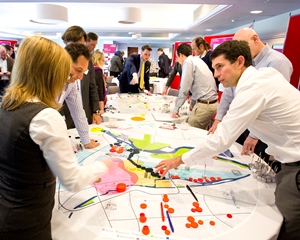Creating a smart and sustainable future for Reading 2050
Release Date 28 May 2014

Representatives from major employers, academics, investors, entrepreneurs, planning experts and a wide range of Reading stakeholders came together to create a vision for the future of Reading in 2050 in a unique event led by local planning & design consultancy, Barton Willmore, the University of Reading and Reading UK CIC, the economic development company for Reading, and sponsored by the Walker Institute for Climate System Research at the University of Reading.
Many ideas, based on futures-based thinking, were shared by more than 50 people with a stake in the future of Reading as they aimed to create a vision that will deliver a smart and sustainable Reading by 2050.
Well known local employers attending the event included business park owners (Segro and Oxford Properties) and lawyers (Olswang) as well as Peter Brett Associates, Jacobs Jewellers, SSE, the organisers of the Reading Festival, Reading Borough Council's sustainability team and First Great Western operators, First Group.
By bringing together representatives of the area's major employers together with landowners, developers, business community representatives and local authorities, Reading Future 2050 aims to create a vision for the Reading urban area that is ambitious but also has the potential to be turned into a reality.
Delegates were asked to question the current strengths and opportunities within Reading, in terms of people and lifestyle, economy, employment and place and environment, considering elements such as how the River Thames can become a focal point for the city centre, how Greater Reading can make the most of its tremendous historic assets such as Reading Abbey, and how it can become a balanced city of residents, commuters, business, leisure and tourism.
A key focus in the workshop was how Reading can harness its potential as a hub for innovation, economic growth and environmental technology with a future that is not only leveraged through smart or technology-led innovation, but also addresses the need for low carbon living by 2050. Smartphone timetables, smart sensors in homes to monitor energy consumption and LED streetlights were envisaged, and a ‘Postcards from the Future' exercise asked delegates to send a greeting to their friends, boss and family from 40 years into the future.
Reading Future 2050 was initially conceived via an event Barton Willmore held last summer which brought together young professionals from a range of industries to think creatively about how the city should look in 50 years' time. The Reading Future 2050 event drew on EPSRC Retrofit 2050 research from Professor Tim Dixon at the University of Reading, and the original event's initial ideas, to develop a collaborative workshop format that allowed everyone to make the most of the knowledge and understanding of established sector professionals and academics, many of whom live and work in Reading and its local area.
Kim Cohen, Partner in Barton Willmore's Reading head office, said: "We set out to ask the really big questions about Reading, like why does the town centre not make more of the River Thames and why don't people see it as a tourist destination despite the wealth of history and culture we have here.
"By getting the people who create the jobs, the people who own the land, the people who live here and the people who will build the Reading of the future all together we are aiming to create a vision for the future of Reading that can actually become a reality."
Professor Tim Dixon, expert on sustainable cities at the University, who co-facilitated the workshop with Stephen Tucker of Barton Willmore, said:
"The Reading Future 2050 project is a great example of a co-created and partnership-led vision for one of the most important urban areas in the UK. The idea was to scope out a vision for Reading that would make sense in terms of this agenda around smart cities - a city that uses technology to make life better for its citizens, but does not compromise the need for low carbon living.
"This will help inform the development of future visions for other towns and cities in the area, and also connect with the important work of the UK government's new Future Cities Foresight and Smart Cities programmes."
Nigel Horton-Baker, Executive Director, Reading UK CIC, said: "Reading needs to plan for its future in a co-ordinated and sustainable way that champions its strengths and brings together the sum of its parts in a coherent way. Reading is already a great place to live and work, but by combining vision with learning from others about planning for the best use of resources and infrastructure, it can become a true leading UK city."
Reading-based Barton Willmore, the country's leading independent planning and design consultancy, co-hosted the event at the University of Reading with the support of Reading UK CIC and the Walker Institute for Climate System Research.